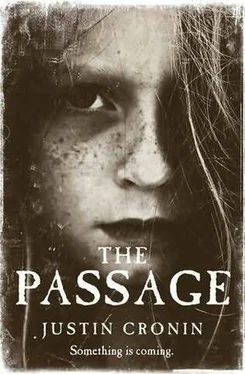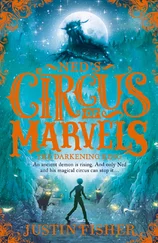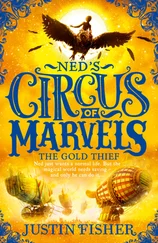“Do you know how to swim?”
Amy shook her head.
“All right, I’ll teach you.”
He took her by the hand and led her into the lake. The water was shockingly cold. They stepped together into deeper water, until it reached Amy’s chest. Wolgast picked her up then and, holding her horizontally, told her to move her arms and legs, like so.
“Let go,” she told him.
“Are you sure?”
She was breathing quickly. “Uh-huh.”
He released her; she sank like a stone. Through the ice-clear water, Wolgast could see that she’d stopped moving; her eyes were open and looking around, like an animal examining some new habitat. Then, with a startling grace, she extended her arms and brought them around, turning her shoulders and pushing herself through the water in a deft, froglike motion. A perfect whip kick: in an instant she was gliding along the sandy bottom, gone. Wolgast was about to dive in after her when she emerged ten feet away, in water that reached well over her head, smiling with exhilaration.
“Easy,” she said, treading with her legs. “Like flying.”
Wolgast, dumbfounded, could only laugh. “Be careful-” he said, but before he could finish she’d filled her lungs with a gulp of air and dived down again.
He washed her hair, did his best telling her how to do the rest. By the time they were done, the sky had darkened from purple to black. Stars by the hundreds, their flickering light doubled in the lake’s still surface; no sounds at all except for their own voices and the basal throb of the lake’s water against the shoreline. He led them up the path with the beam of his flashlight. They ate a dinner of soup and crackers in the kitchen, and afterward, he took her upstairs to her room. He knew she would be awake for hours; the night was her domain now, as it was becoming his own as well. Sometimes he’d sit up half the night, reading to her.
“Thank you,” Amy said as he was settling down with a book: Anne of Green Gables .
“What for?”
“For teaching me to swim.”
“It looked like you already knew. Somebody must have showed you.”
She considered this claim with a puzzled expression. “I don’t think so,” she said.
He didn’t know what to make of any of it. So much of Amy was a mystery. She seemed well-better than well, in fact. Whatever had happened to her at the compound, whatever the virus was, she appeared to have weathered it; and yet the business with the light was strange. And other things: why, for instance, did Amy’s hair not seem to grow? Wolgast’s hair now curled below his collar; and yet Amy, as he looked at her, appeared exactly the same. He’d never trimmed her fingernails either, nor seen her do this. And of course the deeper mysteries: What had killed Doyle and everyone else in Colorado? How could that have been both Carter and not Carter on the hood of the car? What had Lacey meant when she’d said to him that Amy was his, that he’d know what to do? It seemed so; he had known what to do. And yet he could explain none of this.
Later, when he finished reading for the night, he told her that in the morning he’d be going down the mountain. She was well enough, he thought, that she could stay in the lodge by herself. It would only be for an hour or two. He’d be back before she knew it, before she was even awake.
“I know,” she told him, and Wolgast didn’t know what to make of this, either.
He left at a little after seven. After so many weeks sitting idle, collecting pollen from the trees, the Toyota put up a long, wheezing protest when he tried to start it, but eventually the engine caught and held. The morning fog off the lake was just beginning to burn away. He put it in gear and began his long creep down the drive.
The closest real town was thirty miles away, but Wolgast didn’t want to go that far. If the Toyota broke down, he’d be stranded, and so would Amy. The gas gauge was close to empty in any event. He retraced the route of their arrival, pausing at each fork to double-check his memory. He saw no other vehicles, which wasn’t surprising in such a remote place; and yet this absence disturbed him. The world he was returning to, however briefly, felt like a different place than the one he’d left three weeks ago.
Then he saw it: MILTON’S DRY GOODS / HUNTING, FISHING LIC. In the dark, that first night, it had seemed larger than it was; in fact it was just a small, two-story house of weathered shingles. A cottage in the woods, like something in a fairy tale. No other cars were in the lot, though an old van, mid-1990s vintage, was parked on the grass at the rear. Wolgast exited the Toyota and stepped to the front door.
On the porch were half a dozen newspaper vending boxes, all empty but one: USA Today . He could see the large headline splashed across it through the dusty door, which was propped open. When he withdrew a copy, he found that the paper was just two folded sheets long. He stood on the porch and read.
CHAOS IN COLORADO
Rocky Mountain State Overrun by Killer Virus; Borders Sealed
Outbreaks Reported in Nebraska, Utah, Wyoming
President Places Military on High Alert, Asks the Nation to
Remain Calm in the Face of “Unprecedented Terroristic Threat”
WASHINGTON, May 18-President Hughes vowed tonight to take “all necessary measures” to contain the spread of the so-called Colorado fever virus and punish those responsible, declaring, “The righteous anger of the United States of America will swiftly befall the haters of liberty and the outlaw governments that give them harbor.”
The president spoke from the Oval Office in his first address to the nation since the crisis began, eight days ago.
“Unmistakable evidence exists that this devastating epidemic is not an occurrence of nature but the work of anti-American extremists, operating within our own borders but supported by our enemies abroad,” Hughes told an anxious nation. “This is a crime not only against the people of the United States but against all humanity.”
His speech came after a day when the first cases of the illness were reported in neighboring states, just hours after Hughes ordered Colorado’s borders closed and placed the nation’s military on high alert. All domestic and international air travel was also grounded by presidential order, leaving the nation’s transportation hubs in turmoil, as thousands of stranded travelers sought other means to get home.
Seeking both to reassure the country and counter growing criticism that his administration has been slow to act on the crisis, Hughes told the nation to prepare for a formidable struggle.
“I ask you tonight for your trust, your resolve, and your prayers,” the president told the country. “We will leave no stone unturned. Justice will be swift.”
The president did not specify which groups or nations were the targets of federal scrutiny. He also declined to elaborate on the nature of any evidence the administration had uncovered to indicate the epidemic is the work of terrorists.
Presidential spokesman Tim Romer, when asked about a possible military response, told reporters, “We’re ruling nothing out at this point.”
Reports from local officials inside the state indicate that as many as fifty thousand people may have died already. It is unclear how many of the victims succumbed to the disease itself and how many were slain by violent attacks at the hands of those infected. Early signs of exposure include dizziness, vomiting, and a high fever. After a brief incubation period-as short as six hours-the illness appears, in some cases, to bring about a marked increase in physical strength and aggressiveness.
“Patients are going crazy and killing everybody,” said one Colorado health official, who asked to remain anonymous. “The hospitals are like war zones.”
Читать дальше












